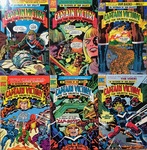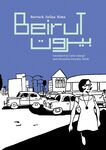
Get ready for a 474 page graphic novel that entirely transpires on the one single day of the title. Move over Virginia Woolf, step aside Marcel Proust, get back James Joyce, Olivier Schrauwen is here to dilate time and fill it with consciousness, comics-style! Schrauwen's choice of imagery and manner of drawing it adds dimension and perspective to the stream of consciousness, creating meanings otherwise invisible – and in the process puts the comic in comic book. In addition to being a masterpiece, this is a very funny book.
Schrauwen knows how to leverage the innate strengths of comics like few others. If you want to know what unflattening looks like, this is it. The eternal, innate connectivity inherent in consciousness is linked to the contemporary enhanced, hyper connectivity enabled by technology. Through Schrauwen's consummate – and constant – contrapuntal collaging of images and text – largely that of the protagonist's ceaseless internal monologue – connections multiply leading to an exponential growth in interpretations such that any possibility of stable definitive meaning seems finally out of reach and a sense of random and incomprehensible simultaneity pervades. Until it finally dissapates in the tour de force climax of the work, and meaning is revealed to be consubstantial with community.
Sunday is at its core a portrait of consciousness as an isolated self-consciousness. But it is a self-consciousness that is, in turn, undercut by a pervasively intrusive authorial consciousness. This authorial consciousness, intriguingly, operates primarily on the visual plane, via its register of images. Thus it is through the contrasting imagery that the textually embodied isolation is revealed as demonstrably illusory. And, as a value-add, these authorial intrusions are both deftly insightful and sharply satirical, giving the work an equally pervasive comic air that is often laugh-out-loud funny. This is comics.
Its text is so densely layered that the process of reading Sunday lifts one outside of oneself, delivering its readers from their mundane cares and into the spiritual promise once anticipated on that holy day. Its title also does double duty in pointing to another aspect of its construction, namely that it can trace its roots back to the early newspaper comics Sunday pages from a century prior, through which the language of the medium was forged, and which Sunday, to varying degrees, recapitulates the development of – most notably its slapstick elements. And woven through all is a through composed irony that eventually reveals itself be ouroboric in nature.
We've posted a gallery of panels and pages on the Copacetic Tumblr, HERE.
You can read Matt Seneca's recent TCJ interview with Schrauwen, HERE.
full color | 8" x 10" | heavy, pulpy, offwhite paperstock | softcover w/ extra-large French flaps





















